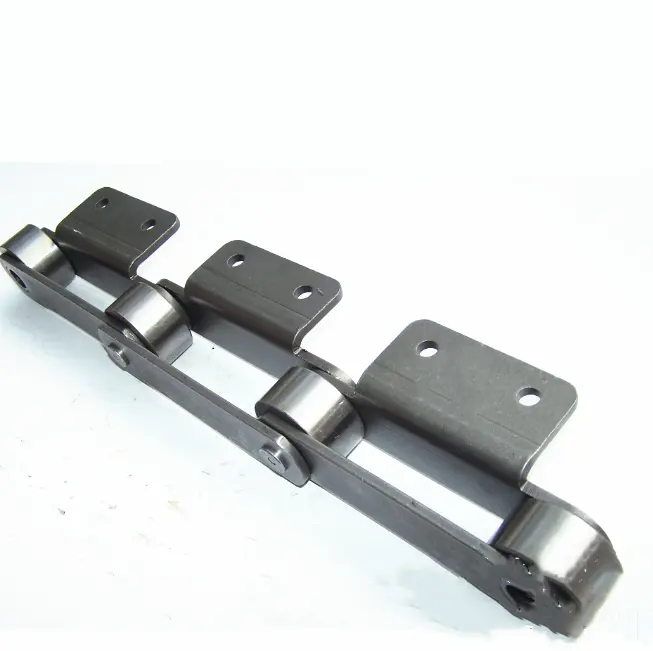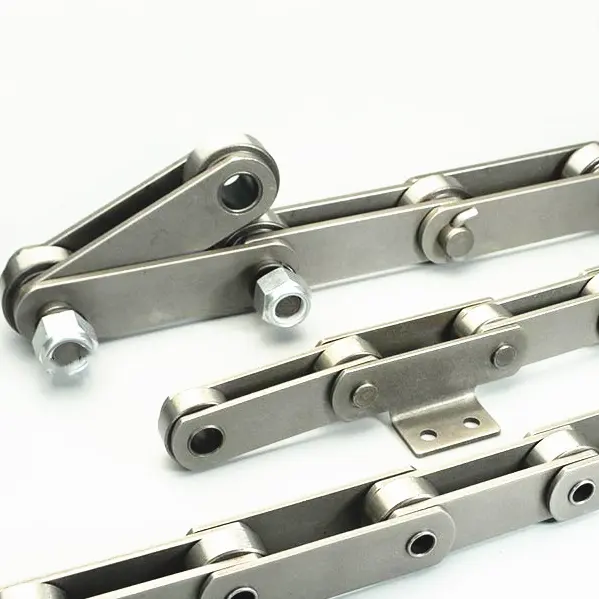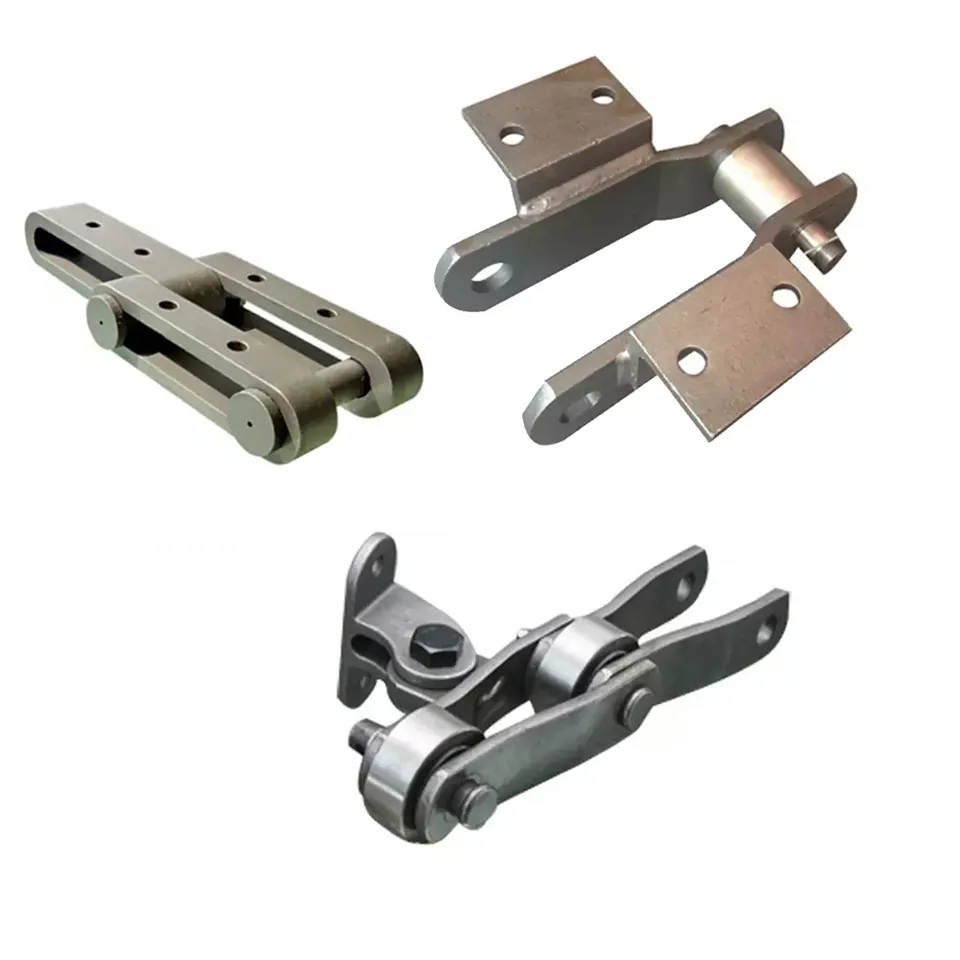Product Description
Palm Oil Mills chain
palm oil conveyor roller chain, coconut palm oil chain,foods containing palm oil Chain,organic palm kernel oil chain,Oil Palm Plant Chain,Palm oil chain P101.6F2, P152F14, P152F17
Meet or exceed DIN, ANSI, ISO, BS, JS standard, and our chains stand up to the toughest working environments with years of trouble-free performance.
We can design and manufacture almost any solution for power transmission problems. We offer quality, reliable products that perform consistently under the harshest conditions. Our products are competitively priced, readily available and deliver on time, which means you get what you need, when you need it.
Sourcing from us brings you profit, and your OEM/ODM items are always welcomed, looking CHINAMFG to establish CHINAMFG business relations with you in the near future.
General Standard for Roller Chain:
ROLLER
Solid Roller
Material 1035, 1045 or 1050
Through harden with surface and core 40-45HRC
Shot peening per the spec
BUSHING
Solid or Split Bushing per the spec
Material 1019M or 1571
Case harden(Carburized) 89HR 15Minimum
Hardness total case depth per the spec
CASE HARDENED PIN
Material 10B21 fine grain, 4118 or 8620
Case harden(Carburized) 89HR 15Minimum
Hardness total case depth per the spec
PLATE(Connectors, Links and Sides )
Material 1045 or 1050
Through harden with surface and core 39-45HRC
| P | P | d1(max) | b1(min) | Pt | N | N | h2(max) | Q | Q | Q | |
| in | mm | mm | mm | mm | mm | KN | KN | KN | |||
| 60 | 3/4″ | 19.05 | 11.91 | 12.70 | 22.78 | 1099 | 1833 | 18.08 | 31.27 | 62.54 | 93.81 |
| 80 | 1″ | 25.40 | 15.87 | 15.88 | 29.29 | 1944 | 3238 | 24.13 | 55.60 | 111.20 | 166.80 |
| 100 | 11/4″ | 31.75 | 19.05 | 19.05 | 35.76 | 2825 | 4715 | 30.18 | 86.84 | 173.68 | 260.52 |
| 120 | 11/2″ | 38.10 | 22.22 | 25.40 | 45.44 | 3821 | 6361 | 36.20 | 125.10 | 250.20 | 375.30 |
| 140 | 13/4″ | 44.45 | 25.4 | 25.40 | 48.87 | 4982 | 8363 | 42.24 | 170.27 | 340.54 | 510.81 |
| 160 | 2″ | 50.80 | 28.57 | 31.75 | 58.55 | 6316 | 10542 | 48.26 | 222.40 | 444.80 | 667.20 |
| 180 | 21/4″ | 57.15 | 35.71 | 35.71 | 65.84 | 9430 | 15747 | 54.31 | 281.57 | 563.14 | 844.71 |
| 200 | 21/2″ | 63.50 | 39.67 | 38.10 | 71.55 | 12188 | 2571 | 60.33 | 347.41 | 694.82 | 1571.23 |
| 240 | 3″ | 76.20 | 47.62 | 47.62 | 87.83 | 15747 | 23931 | 72.39 | 500.40 | 1000.80 | 1501.30 |
/* March 10, 2571 17:59:20 */!function(){function s(e,r){var a,o={};try{e&&e.split(“,”).forEach(function(e,t){e&&(a=e.match(/(.*?):(.*)$/))&&1
| Usage: | Transmission Chain, Conveyor Chain |
|---|---|
| Material: | Alloy |
| Surface Treatment: | Oil Blooming |
| Feature: | Heat Resistant |
| Chain Size: | 1/2"*11/128" |
| Structure: | Roller Chain |
| Samples: |
US$ 60/Piece
1 Piece(Min.Order) | |
|---|
| Customization: |
Available
| Customized Request |
|---|

How do mill chains handle material flow and transfer in bulk handling applications?
Mill chains are specifically designed to handle material flow and transfer in bulk handling applications with efficiency and reliability. These chains are widely used in various industries, such as agriculture, mining, construction, and more, where bulk materials need to be transported in large quantities. Here’s how mill chains achieve material flow and transfer:
1. Robust Construction: Mill chains are constructed using high-quality materials, such as alloy steel, which provides excellent strength and durability. Their robust design allows them to handle heavy loads and withstand the stresses of continuous material transfer.
2. Precise Alignment: The design of mill chains ensures precise alignment between the chain and sprockets. This alignment helps to maintain a smooth and consistent material flow, reducing the risk of jams or blockages in the system.
3. Flexibility: Mill chains are flexible enough to adapt to various conveyor configurations, including inclined or declined conveyors. This flexibility enables them to efficiently transport materials across different terrains and elevations.
4. Low Friction: Mill chains are designed to minimize friction during operation. This low friction characteristic reduces the energy consumption and wear on the chain, resulting in a longer service life and improved material transfer efficiency.
5. Adaptability: Mill chains are suitable for handling a wide range of bulk materials, including grains, aggregates, ores, coal, wood chips, and more. Their adaptability makes them a versatile choice for different industries.
6. Conveyor Systems: In bulk handling applications, mill chains are commonly used in conveyor systems. These systems utilize rotating sprockets to move the chain, and the material is carried along the conveyor’s path, ensuring a continuous flow of materials from one point to another.
7. Bucket Elevators: Mill chains are often employed in bucket elevators, which lift and transfer bulk materials vertically. The buckets attached to the chain scoop up the material and discharge it at the desired location, providing an efficient material handling solution.
Overall, mill chains are essential components in bulk handling applications, ensuring the smooth and consistent flow of materials in various industrial processes. Their reliable performance, strength, and adaptability make them a preferred choice for material transfer in many industries.

How do mill chains contribute to the efficient and reliable material transfer?
Mill chains play a crucial role in ensuring efficient and reliable material transfer in various industrial applications. Their design and characteristics make them well-suited for handling heavy loads, abrasive materials, and high-temperature environments. Here are some ways mill chains contribute to efficient and reliable material transfer:
- Strength and Durability: Mill chains are typically made from high-quality materials, such as alloy steel, which provides excellent strength and durability. This allows them to withstand the stress and load of heavy materials during material handling processes.
- Precision Engineering: Mill chains are precision-engineered to have consistent pitch and link dimensions, ensuring smooth and reliable operation in conveyor systems and material transfer equipment.
- Uniform Material Flow: The precise design of mill chains ensures uniform material flow, reducing the risk of blockages and disruptions in the material transfer process.
- Low Maintenance: Due to their durable construction, mill chains require minimal maintenance, resulting in reduced downtime and increased overall efficiency.
- High Temperature Resistance: In applications where high temperatures are involved, such as in steel mills or cement kilns, mill chains can withstand the heat without compromising their performance.
- Adaptability: Mill chains can be designed and manufactured to suit specific material handling requirements, making them versatile and suitable for a wide range of industries.
- Reduced Wear and Tear: The use of high-quality materials and precision manufacturing helps reduce wear and tear on mill chains, leading to extended service life and reliable performance.
By ensuring smooth and efficient material transfer, mill chains contribute to increased productivity, reduced downtime, and overall cost-effectiveness in industrial operations. Proper selection, installation, and maintenance of mill chains are essential to harness their full potential and achieve optimal material handling performance.

What materials are mill chains typically made of for different industries?
Mill chains are manufactured using various materials to suit the specific requirements of different industries and applications. The choice of material depends on factors such as the operating environment, load capacity, and resistance to wear and corrosion. Here are some commonly used materials for mill chains in different industries:
1. Carbon Steel: Carbon steel mill chains are widely used in various industrial applications due to their high tensile strength and affordability. They are suitable for medium to heavy-duty material handling tasks and can withstand harsh conditions.
2. Stainless Steel: Stainless steel mill chains are preferred in industries where corrosion resistance is crucial. They are commonly used in food processing, chemical, and pharmaceutical industries where exposure to moisture, chemicals, or high temperatures can occur.
3. Alloy Steel: Alloy steel mill chains are known for their exceptional strength and durability. They are used in heavy-duty applications, such as steel manufacturing, mining, and forestry, where the chains are subjected to significant loads and abrasion.
4. Nickel-Plated Steel: Nickel-plated steel mill chains provide additional protection against corrosion and wear. They are often used in industries where exposure to chemicals or outdoor elements is a concern.
5. Plastic or Polymer: In certain industries, such as food and beverage manufacturing or electronics, plastic or polymer mill chains may be used. These chains offer non-metallic properties, making them ideal for applications that require chemical resistance and low-noise operation.
6. Galvanized Steel: Galvanized steel mill chains are coated with a layer of zinc to enhance their corrosion resistance. They are commonly used in outdoor applications or environments where moisture and rust may be a concern.
It’s essential to choose the right material based on the specific needs of the industry and the operating conditions of the application. Factors such as load capacity, speed, temperature, and exposure to chemicals or moisture play a crucial role in determining the appropriate material for mill chains in different industries.


editor by CX 2023-12-29